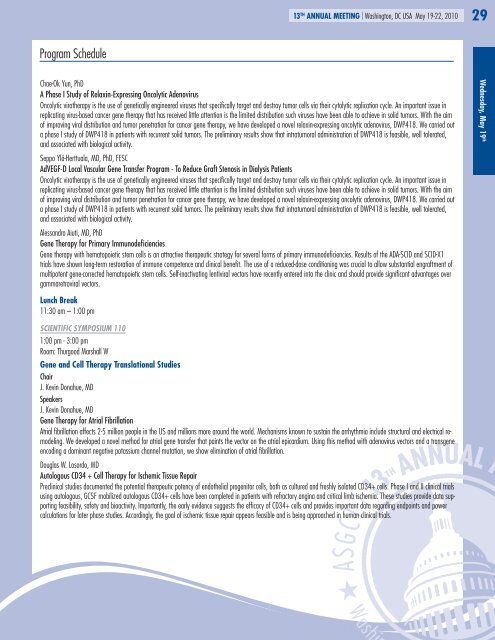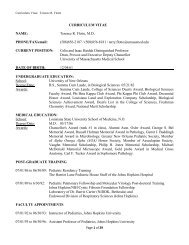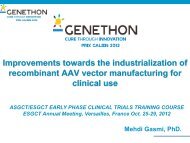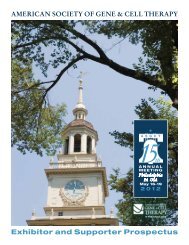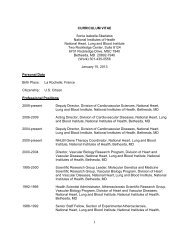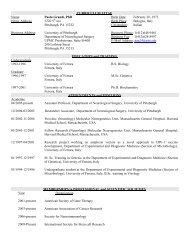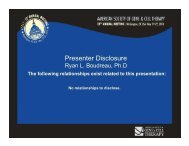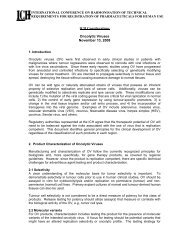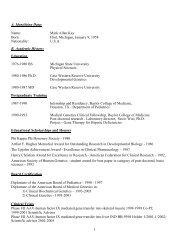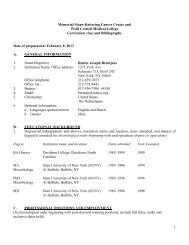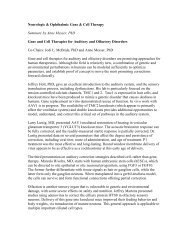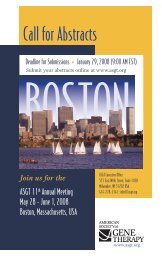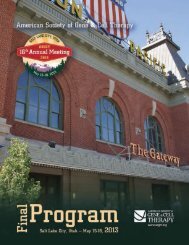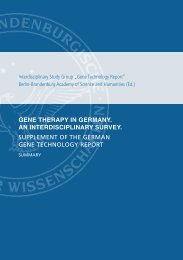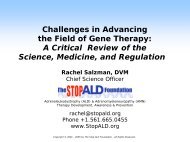FINAL PROGRAM - American Society of Gene & Cell Therapy
FINAL PROGRAM - American Society of Gene & Cell Therapy
FINAL PROGRAM - American Society of Gene & Cell Therapy
- No tags were found...
Create successful ePaper yourself
Turn your PDF publications into a flip-book with our unique Google optimized e-Paper software.
13 th AnnUAL MEETing | Washington, DC USA May 19-22, 2010 29Program ScheduleChae-Ok Yun, PhDA Phase I Study <strong>of</strong> Relaxin-Expressing Oncolytic AdenovirusOncolytic virotherapy is the use <strong>of</strong> genetically engineered viruses that specifically target and destroy tumor cells via their cytolytic replication cycle. An important issue inreplicating virus-based cancer gene therapy that has received little attention is the limited distribution such viruses have been able to achieve in solid tumors. With the aim<strong>of</strong> improving viral distribution and tumor penetration for cancer gene therapy, we have developed a novel relaxin-expressing oncolytic adenovirus, DWP418. We carried outa phase I study <strong>of</strong> DWP418 in patients with recurrent solid tumors. The preliminary results show that intratumoral administration <strong>of</strong> DWP418 is feasible, well tolerated,and associated with biological activity.Wednesday, May 19 thSeppo Ylä-Herttuala, MD, PhD, FESCAdVEGF-D Local Vascular <strong>Gene</strong> Transfer Program - To Reduce Graft Stenosis in Dialysis PatientsOncolytic virotherapy is the use <strong>of</strong> genetically engineered viruses that specifically target and destroy tumor cells via their cytolytic replication cycle. An important issue inreplicating virus-based cancer gene therapy that has received little attention is the limited distribution such viruses have been able to achieve in solid tumors. With the aim<strong>of</strong> improving viral distribution and tumor penetration for cancer gene therapy, we have developed a novel relaxin-expressing oncolytic adenovirus, DWP418. We carried outa phase I study <strong>of</strong> DWP418 in patients with recurrent solid tumors. The preliminary results show that intratumoral administration <strong>of</strong> DWP418 is feasible, well tolerated,and associated with biological activity.Alessandro Aiuti, MD, PhD<strong>Gene</strong> <strong>Therapy</strong> for Primary Immunodeficiencies<strong>Gene</strong> therapy with hematopoietic stem cells is an attractive therapeutic strategy for several forms <strong>of</strong> primary immunodeficiencies. Results <strong>of</strong> the ADA-SCID and SCID-X1trials have shown long-term restoration <strong>of</strong> immune competence and clinical benefit. The use <strong>of</strong> a reduced-dose conditioning was crucial to allow substantial engraftment <strong>of</strong>multipotent gene-corrected hematopoietic stem cells. Self-inactivating lentiviral vectors have recently entered into the clinic and should provide significant advantages overgammaretroviral vectors.Lunch Break11:30 am – 1:00 pmScientific Symposium 1101:00 pm - 3:00 pmRoom: Thurgood Marshall W<strong>Gene</strong> and <strong>Cell</strong> <strong>Therapy</strong> Translational StudiesChairJ. Kevin Donahue, MDSpeakersJ. Kevin Donahue, MD<strong>Gene</strong> <strong>Therapy</strong> for Atrial FibrillationAtrial fibrillation affects 2-5 million people in the US and millions more around the world. Mechanisms known to sustain the arrhythmia include structural and electrical remodeling.We developed a novel method for atrial gene transfer that paints the vector on the atrial epicardium. Using this method with adenovirus vectors and a transgeneencoding a dominant negative potassium channel mutation, we show elimination <strong>of</strong> atrial fibrillation.Douglas W. Losordo, MDAutologous CD34 + <strong>Cell</strong> <strong>Therapy</strong> for Ischemic Tissue RepairPreclinical studies documented the potential therapeutic potency <strong>of</strong> endothelial progenitor cells, both as cultured and freshly isolated CD34+ cells. Phase I and II clinical trialsusing autologous, GCSF mobilized autologous CD34+ cells have been completed in patients with refractory angina and critical limb ischemia. These studies provide data supportingfeasibility, safety and bioactivity. Importantly, the early evidence suggests the efficacy <strong>of</strong> CD34+ cells and provides important data regarding endpoints and powercalculations for later phase studies. Accordingly, the goal <strong>of</strong> ischemic tissue repair appears feasible and is being approached in human clinical trials.


